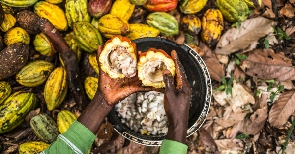One day at Goka, a bird perched on the fence of a man's house with a seed in its beak. The beauty of the bird endeared it to the man so that he didn't pelt it with a stone or scare it away.
The bird saw the friendliness of the man, and sat comfortably pecking the seed until it fell from its beak and landed outside the wall.
The bed flew away.
The man went out to check the seed, and it was very small. So he said it posed no threat, for it can't even germinate.
Days went by, he returned to the spot, and saw the seed sprouting.
This time, he said the soil is not fertile for the seedling to grow, so it'll wither and die sooner.
Weeks later, he saw the seedling growing into a beautiful shrub, and the man admired its scented flowers.
He never thought of cutting it down. And in few years, the small seed grew into a big shady tree with widened and protruded roots.
The shade of the tree gave comfort to the man from sunshine, but the roots that entered under the fence created in it a crack. The man was now left between the choices of keeping the tree because of its shade, or cutting it down to save the fence from collapsing.
In his indecision, one day he woke up to see his fence broken down, causing a major damage to his property. This was at the time that his bones were weak to labour again and rehabilitate his house.
Before he died unhappy man, the tree had wrecked down all the remains of the man's house, and it was under its shade that he was found dead.
Moral Lesson
Deal with small problems before they grow bigger.
Inference
When it came in the news that China is now rivalling Ghana in the production of cocoa, those mandated to discover means that will keep our premium cocoa beans unchallenged are sitting behind their desks and coming out with all voodoo (abracadabra) theories.
The finance Minister, Mr. Ofori-Attah says it poses no threats to Ghana, “because the Chinese will in turn generate taste for Ghana's cocoa" (sic).
And yesterday, the head of COCOBOD, Mr. Joseph Boahen Aidoo, is reported to have said: _"even the climatic conditions of China will not let it be competitive in the production of the commodity, as cocoa don't do well under climates below 21 degrees Celsius"_ (sic)
These men are peremptorily belittling the fears Ghanaians with concerns for the wellbeing of the cocoa sector harbour with these unfound theories, albeit ambivalence.
My native Goka people say: _aboa no nyaw' na ɔnnka wo a ɔnfee nese nkyerɛ wo._
We're talking about a China that has sold its first cocoa beans to the European market, harvesting with technology that is a far cry from our medieval usage of obsolete tools in cutlasses and human labour all throughout.
The threats are posed thus, no one expects the government of Ghana stops the Chinese, but it's time we adapt ourselves with a modern technology and stay afloat in the cocoa market, building on nature's blessing in good tropical climate.
With modern technology, there is no seed that you can't plant and harvest at anywhere of your choice if you desire to.
We can't comfortably say our priced flagship cocoa is not under threats with the presence of the Chinese in the market. Let's deal with the threats before they grow bigger.
Opinions of Tuesday, 1 June 2021
Columnist: Charles Yeboah Sir Lord















